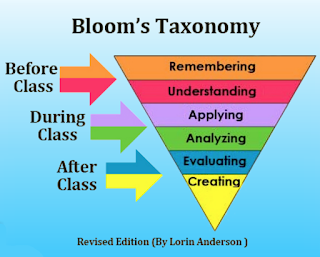Mistakes and Innovation
Who expects me to know how to do something correctly on the first try?
I do.
Failure? Mistakes? Please.
I want to impress. I want to get it RIGHT. The first time.
But as I get older I realize the ways in which this line of thinking limits my experience. It makes me risk-averse and keeps me thinking conventionally.
One of the two-year goals at my school is to encourage innovation in the classroom. By definition, innovation means taking a chance on something new -- something that will likely result in mistakes. As faculty design new projects, write new lesson plans and reevaluate assessment strategies they will make mistakes. So how can our school encourage risk-taking and make it safe to fail?
As I wrestled with this idea I heard about a New York advertising company that hands out “Heroic Failure” awards, given to employees for “taking a big, edgy risk.” Would that type of incentive encourage innovation in the classroom? Perhaps it is a good start. But building a culture in which teachers are not afraid to admit failure and vulnerability sounds even better. That's why I loved Sarah Brown Wessling’s article about a “lesson gone wrong.” She shares all the dirty details surrounding a classroom disaster, including how she improvised and adapted over the course of the day to correct her mistakes.
“English class was a total bomb… they were unengaged, unmotivated and uninterested in anything related to the lesson…I immediately I started to consider my mistakes: 1) I stood in front of the class for too long, talking at my students; 2) I gave directions that weren’t clear enough (which meant the task wasn’t as clear in my mind as I thought it was); 3) the students hadn’t been aptly prepared to read these texts on their own."The lesson was caught on video and Wessling was surprised by its resonance with fellow educators.
“This video was also the first of its kind—a clear disaster, a teacher thinking out loud about how to contend with it and the recovery with reflection… I was surprised and humbled by what I heard: “You’re so brave,” “This is inspirational,” “What courage to show what happens to all of us” or “This is the art of teaching.” As I noticed patterns in the feedback, I started to piece together what made this video so compelling: it exposed what we try so hard not to talk about in teaching.”It struck me how easy it is to “talk to talk” about the benefit of making mistakes, yet how uncomfortable it is to “walk the walk.” If we want our students to try new things, what better way than to model this behavior as teachers?
This is all to say I am thinking about ways to build and nurture a culture where it is safe for faculty to make mistakes -- where mistakes are shared, and perhaps even celebrated.
So, I'll start with this blog. I'm sure I've made typos and grammatical errors in here. I'm confident some folks won't agree with this post. Others will think it's too iterative of other things they have read. But, no bother. I am going to try something new, and I will make mistakes!
So here’s to the new school year! Go make a mistake!

I am so glad you wrote and shared this. I strongly relate - I am sure so many others do too. Your post brings to mind so many ideas, but the one that I can't resist sharing: I LOVE the idea of videotaping lessons. I have done it myself and helped others do it, and it is one of the most powerful opportunities for professional growth. And it is SCARY. But it helps us grow.
ReplyDeleteAlso: perhaps don't call it "failure", call it "iteration."
Keep writing! Looking forward to reading more.
"Go make a mistake!" is my new favorite directive! I often think about what our world would be like if embarrassment didn't exist. Sometimes I try to act like it doesn't, but it is really hard in certain areas of my life to put that into practice.
ReplyDeleteI can totally relate even in the sporting world. I used to get frustrated with myself when I would fall or get stuck in a bowl or deep powder snowboarding. Then I started telling myself this simple phrase "you have the permission to fail". This allowed me to try crazy, unsafe or even stupid tricks or paths down the mountain in search of great adventure or fresh powder. Often times I would end up lying in a heap of snow struggling for 10 minutes to get back on the run. But every once in a while, I would find an amazing, hidden run down the mountain that I would repeat again and again with a giant smile on my face.
ReplyDeleteThis articles resonates with me in my classroom and in my personal life as a parent and learning of technology. It is so hard to remember that failure in part of the path to knowledge and success.
ReplyDelete